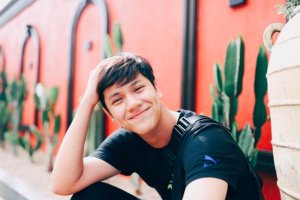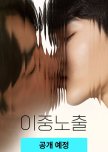Esta resenha pode conter spoilers
A Double-Edged Exposure
Double Exposure (이중노출) is a Korean BL film released on October 18, 2024, on Heavenly, written and directed by Kim Min-wook and starring No Ji Hun as Myeong Seon, alongside Kim Sung Kyung as Gi Jun and Jeong Hyeon. The story revolves around Myung Seon, a photographer who crosses professional lines with his assistant’s boyfriend, Gi Jun, only to later encounter Jung Hyun, a man who bears an uncanny resemblance to Gi Jun but has a starkly different personality. This meeting leads Myung Seon to wonder whether Gi Jun ever really left his life.
The premise is intriguing, but after watching Double Exposure multiple times, I found myself struggling to grasp the film’s underlying message. It seemed to be pushing for something profound, yet it often felt more confusing than deep. When it wasn't relying on explicit scenes, it shifted to dialogue that aimed to be meaningful but came off as dull and repetitive. It could’ve been a straightforward, sensual film, but it seemed compelled to inject an "artsy" significance, which fell flat.
One striking example is the film’s fixation on hands. When Myeong Seon first meets Gi Jun, they have an oddly philosophical exchange about hands, and Myeong Seon even compares Gi Jun’s hands to those in a da Vinci painting. From there, hands become a central motif—close-ups of hands unclenching, fidgeting, and being directed in stiff poses during the photoshoot. By the end, we're hit over the head with a close-up of the Mona Lisa's hands, underscoring this metaphor that felt overused and, frankly, unnecessary.
The characters themselves feel underdeveloped. Myeong Seon, aloof and distant, is well aware of his own cruelty but seems detached from the consequences of his actions. He chooses to treat Gi Jun as a fleeting muse, disregarding their affair’s moral complications. And yet, when he encounters Jung Hyun, Gi Jun’s stronger-willed doppelgänger, there’s a palpable shift. Suddenly, Myeong Seon abandons his polished professional camera for a rawer 35mm film camera and even a Polaroid, capturing Jung Hyun in unguarded, candid shots. The perspective changes subtly as he finds himself drawn closer to this version of Gi Jun.
Despite the intrigue around the “are they or aren’t they the same person” mystery, the weak plot and lack of character development overshadowed it for me. The film seemed bogged down by monotonous dialogue, leaving little space for meaningful growth.
That said, I can understand the appeal for some viewers. For those who appreciate a raw, artistic exploration of sensuality, it might feel refreshing. There's a sense of Japanese gay cinema’s influence throughout, and the natural portrayal of the male leads is unique for Korean film. It does take courage to create something with such unfiltered intimacy.
The twist was decent, and perhaps with more development, it could’ve packed a stronger punch. Nonetheless, if you’re curious, give it a go; you might find something in it that resonates more with you than it did with me.
The premise is intriguing, but after watching Double Exposure multiple times, I found myself struggling to grasp the film’s underlying message. It seemed to be pushing for something profound, yet it often felt more confusing than deep. When it wasn't relying on explicit scenes, it shifted to dialogue that aimed to be meaningful but came off as dull and repetitive. It could’ve been a straightforward, sensual film, but it seemed compelled to inject an "artsy" significance, which fell flat.
One striking example is the film’s fixation on hands. When Myeong Seon first meets Gi Jun, they have an oddly philosophical exchange about hands, and Myeong Seon even compares Gi Jun’s hands to those in a da Vinci painting. From there, hands become a central motif—close-ups of hands unclenching, fidgeting, and being directed in stiff poses during the photoshoot. By the end, we're hit over the head with a close-up of the Mona Lisa's hands, underscoring this metaphor that felt overused and, frankly, unnecessary.
The characters themselves feel underdeveloped. Myeong Seon, aloof and distant, is well aware of his own cruelty but seems detached from the consequences of his actions. He chooses to treat Gi Jun as a fleeting muse, disregarding their affair’s moral complications. And yet, when he encounters Jung Hyun, Gi Jun’s stronger-willed doppelgänger, there’s a palpable shift. Suddenly, Myeong Seon abandons his polished professional camera for a rawer 35mm film camera and even a Polaroid, capturing Jung Hyun in unguarded, candid shots. The perspective changes subtly as he finds himself drawn closer to this version of Gi Jun.
Despite the intrigue around the “are they or aren’t they the same person” mystery, the weak plot and lack of character development overshadowed it for me. The film seemed bogged down by monotonous dialogue, leaving little space for meaningful growth.
That said, I can understand the appeal for some viewers. For those who appreciate a raw, artistic exploration of sensuality, it might feel refreshing. There's a sense of Japanese gay cinema’s influence throughout, and the natural portrayal of the male leads is unique for Korean film. It does take courage to create something with such unfiltered intimacy.
The twist was decent, and perhaps with more development, it could’ve packed a stronger punch. Nonetheless, if you’re curious, give it a go; you might find something in it that resonates more with you than it did with me.
Esta resenha foi útil para você?





